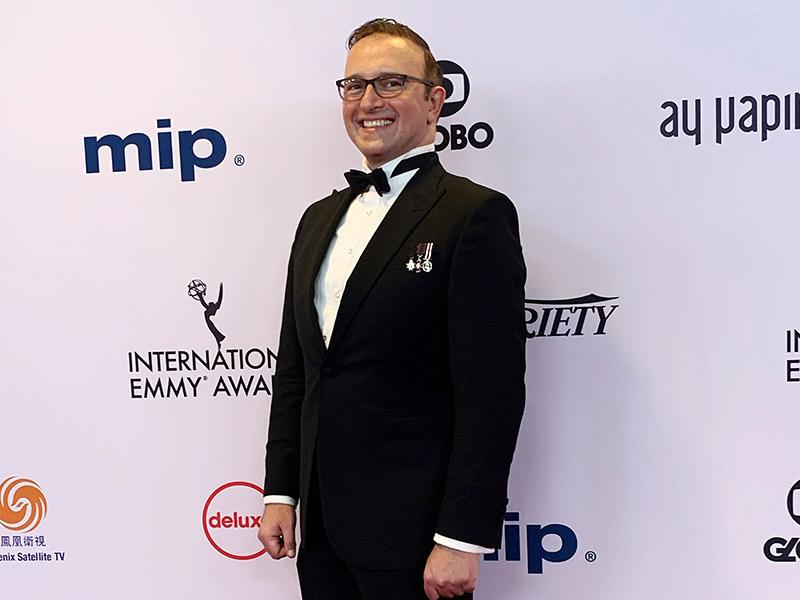School of Business faculty member Dr. Stathis Kefallonitis on the red carpet at the 47th International Emmy Awards ceremony in New York City on Nov. 25.
For School of Business faculty member Dr. Stathis Kefallonitis, walking the red carpet and attending the 47th International Emmy Awards ceremony in New York City was only part of a busy semester of participating in events around the globe.
Kefallonitis’s work on passenger experience and emotions was first established working with Delta Air Lines, American Airlines and gategroup. He argues that passenger offerings should incorporate a lasting emotional perspective. Through this approach, the perceived value of an airline product increases.
Though research, a variety of workshops, presentations, publications and training sessions, he helps transform the way that passenger experience should be addressed and perceived. His approach is facilitating a deeper understanding of passenger engagement through an emotionally pleasing experience that creates tangible value.
He advises air transport regulators, airlines and onboard hospitality providers on how to improve passenger experience by designing emotionally pleasing products and services. The businesses he has worked with include the International Air Transport Association, Airbus, The Airline Passenger Experience Association, the International Flight Services Association, Delta Air Lines, American Airlines and Amtrak.
Kefallonitis’ work was cited and featured in books, journals, popular business publications and media including the Wall Street Journal, New York Times, Passenger International (PAX International), Onboard Hospitality, Airline Passenger Experience (APEX) magazines.
Looking back into the final quarter of 2019, Kefallonitis made headlines by leading change and participating in a number of global events:
47th International Emmy Awards, New York City (Nov. 25)
Kefallonitis was invited to represent the inflight entertainment industry. Onboard entertainment affects the passenger experience in an era that passengers elect to be connected via WiFi to the outside world, watch live-media and latest releases on TV shows and movies. “As travel gets more personalized, the entertainment industry could not be left behind," Kefallonitis explained. "Streaming media to a passenger’s handheld device has become expected in North America and other parts of the world. The availability and quality of multiple media is essential for a complete cabin experience.” He also highlighted that “SUNY Oswego provides students with the latest trends and qualifications that arise from real-world needs. Faculty participation and showcasing of expertise in local, national and international events raises the profile of the institution and places SUNY Oswego among an elite of schools that pioneer experiential learning.”
"Breakfast with Refilwe Moloto" radio show, Capetown, South Africa (Dec. 2)
Kefallontis was an invited guest at CapeTalk Radio, Capetown, South Africa, on the world-acclaimed "Breakfast with Refilwe Moloto" radio show. The live radio interview (available online) focused on how technology affects travel research.
2019 SITA European IT Summit in Lisbon , Portugal (Nov. 5-6)
He was also a keynote speaker at the 2019 SITA European IT Summit in Lisbon. Kefalonitis presented techniques on passenger biometrics under the digital passenger journey theme of the event. The session focused on how digital transformation is impacting and changing the passenger experience, with special focus on mobility, biometrics and identify management.
Wall Street Journal, Business Section, Travel, The Middle Seat by Scott McCartney, "Your Next Vacation is Written on Your Face" (Oct. 2)
Kefallonitis was interviewed and quoted by Scott McCartney, a veteran editor and celebrated journalist and travel writer. Industrial psychologists and emotional behavior researchers use multiple methods to measure passenger emotions. Face recognition, eye-trackers, brain-wave detectors and galvanic skin response units can work to identify what participants like or dislike. Airlines use biometric research to design menus and cabin interiors. Amtrak has been using similar technology to design the new passenger experience. "All this scientific data is changing the travel industry," Kefallonitis said. In addition, he mentioned that although facial recognition has been useful, it is still inadequate when it comes to the more emotionally taxing parts of traveling. “Service is still very crucial," he said. "The one thing that highlights good experience versus bad experience is the crew.”
International Air Transport Association’s Global Passenger Symposium in Warsaw, Poland (Oct. 15-17)
Kefallonitis was a keynote speaker at the prestigious symposium, talking about “Emotional & Behavioral Biometrics: The Next Frontier.” He discussed what neuroscience can tell professionals about passenger emotions and behaviors throughout the passenger journey. He reviewed examples from neuroscience techniques that reveal psychometric information used to assess the passenger sensory experience. Applications presented included aircraft interior design, buy-on-board, safety videos, and product and service design concepts.
International Flight Services Association Expo 2019, Los Angeles (Sept. 10)
Kefallonitis designed, orchestrated and presented the first Innovation Pavilion at the 2019 International Flight Services Association Expo. He opened the Innovation Pavilion with a discussion on innovation. Following, some of the industry’s most influential players discussed strategies, examined the future of air travel, and shared insights on how inflight service plays a key role into passenger experiences, as well as how to leverage this expertise. Sessions included speakers from British Royal Historian on High drinks and beverages, United Airlines, American Airlines and Alaska Airlines executives.




